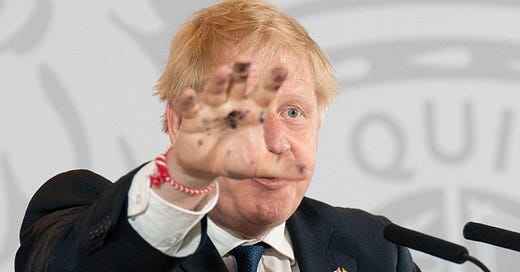Smashing Greenhouses: How Boris Johnson's Lies Gave Him His Power
"Everything I wrote was having this amazing explosive effect," Johnson later recalled.
“I was just chucking these rocks over the garden and I listened to this amazing crash from the greenhouse next door,” said Boris Johnson back in 2005, as he recalled his time as a junior reporter for the Telegraph.
Johnson’s time as the paper’s rock-chucker-in-chief has since become legendary.
He had been hired by Max Hastings shortly after being fired by the Times for making up a quote - something he would later brush off as a “light sandpapering” of the truth.
Yet far from being discouraged by this dishonesty, the Telegraph sent Johnson off to Brussels, where he quickly started filing similarly dubious stories.
His reports painted an incredibly colourful picture of what he portrayed as European bureaucratic excess at the time.
His coverage fit firmly within the popular tabloid “bendy banana” school of journalism, which was then highly prized by right-wing British newspaper editors.
His dispatches earned him much praise from the Telegraph’s management, who enjoyed stoking the internal wars that were being waged within the Conservative Party over Europe.
“Everything I wrote… was having this amazing explosive effect on the Tory party and it really gave me this rather weird sense of power,” Johnson later recalled.
His stories also triggered the jealousy of rivals, who were often infuriated by his apparent ability to get front-page scoops.
This jealousy was not helped by the fact that Johnson’s lurid tales often turned out to have been largely made up.
“Some of his stories were simply not true,” one of his colleagues from the time told Johnson’s biographer Sonia Purnell.
“When I mentioned this to him, Boris just wagged his finger and said, ‘There’ll come a day when you’ll write a story without picking up the phone – we all do.’”
Johnson’s apparent pleasure in “sandpapering” the truth, continued once he decided to become a Conservative MP - breaking a promise in doing so to the Spectator’s then proprietor Conrad Black.
After being given an opportunity to join Michael Howard’s front bench, he was promptly sacked, once again, for lying.
Johnson had repeatedly denied having an extra-marital affair, both to the press and to Howard, only for the truth to then be splashed across the tabloid front pages.
“This is nothing to do with personal morality,” one Conservative source told the Guardian at the time.
“But 'it is a matter for [the leader] when shadow ministers don't tell the truth'.”
A wasp in a jar
Yet rather than trigger an internal crisis of confidence, Johnson’s second sacking for lying merely spurred him on to ever higher levels of ambition.
Within a few years he would become the Conservative Party’s candidate for London Mayor, before then rising to greater heights as Foreign Secretary, and Prime Minister.
Asked once about his apparently violent ambition, which first presented itself as a child, Johnson explained it away in Darwinian terms.
“All politicians are like crazed wasps in a jam jar,” he told Sue Lawley in 2005.
“Each is convinced that they’re going to be the one to make it out and survive.”
This belief in the survival of the fittest has been a running theme throughout Johnson’s career and it sometimes presents itself in quite savage terms.
“The thing about Boris Johnson is that he’s like a rat,” one former ally of the Prime Minister told the Times last year.
“He bumbles on amiably enough until he’s trapped. Then he’ll chew through bone, kill anyone, do anything to get free.”
The problem with seeing politics as a Darwinian race to the top is that it can justify almost any behaviour.
If you have, from an early age, a belief that you are born for greatness, then it becomes very easy to justify doing, or saying, anything to make that belief come true.
So if, as Prime Minister, you believe that lying to parliament is your best hope of surviving, then lie you must. And if your lie is later found out, then simply lie some more. And if eventually the entire “inverted pyramid of piffle” comes tumbling down, then simply create a new lie to distract from the previous ones now cascading around your feet.
Yet while such behaviour may be understandable from Johnson’s perspective, it does not explain why he has been so heavily indulged by others.
As the Conservative MP Steve Baker commented this week, had anyone else in such a powerful position behaved as the Prime Minister has then they would have been “long gone” by now. Yet Johnson has somehow been allowed, not only to survive, but to thrive.
The truth is that Johnson has not succeeded despite the actions of others, but because of them. If the wasp keeps on getting out of the jar, then it’s because other people keep on taking the lid off.
The only way it will ever change is if Johnson’s enablers - what he calls his “deluded collection of stooges” - realise that it is in their interests to keep the lid closed.
Until that day comes, the lies that have sustained Johnson’s rise to power will only continue.






